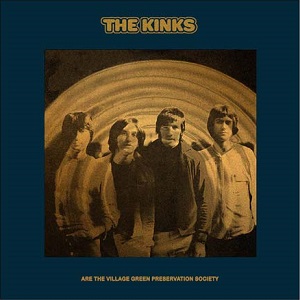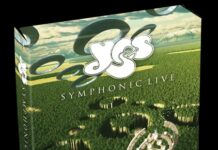You could say The Kinks Are The Village Green Preservation Society is the quintessential British rock album by the quintessential British rock band. For the Kinks, the album’s sophisticated, quaint feel for tradition and a simple life that includes farm animals and photos of friends didn’t translate well with the public at large. It might have also had something to do with the record coming out at the same time as the Beatles’ The White Album and Jimi Hendrix’s Electric Ladyland.
Despite the dismal reception the record received in 1968, the Kinks’ most cohesive and beloved album would go on to become a classic. To celebrate its 50th anniversary, BMG has released a commemorative box set with five CDs, three vinyl LPs, three vinyl 7″ singles, a 52-page book, plus a black envelope filled with memorabilia — posters, photos, sheet music, tickets, little trinkets only the most loyal Kinks fan could appreciate. Along with the 2018 stereo remaster of the original album, there’s a mono mix, bonus tracks, demos, outtakes, live cuts, interviews and a previously unreleased song called “Time Song.” With all this packed into a royal blue, two-inch thick box, The Kinks Are The Village Green Preservation Society is finally getting the recognition it deserves.
Going back, the Kinks fought and hard for recognition when they first burst onto the 1960s British rock scene already crowded with the Beatles, the Rolling Stones, the Who, the Animals, the Yardbirds and many others. “You Really Got Me” and “All Day And All Of The Night” showed they could write catchy songs with a visceral, edgy attack, but bad management and a disarming temperament resulted in a ban from touring the States in 1964 just as their star was beginning to rise.
They could have very well been relegated to the dust bin, until the tide took a turn. Music was evolving from three-chord-three-minute love songs into vessels of substance and sharp observation. Kinks singer and songwriter Ray Davies seized the opportunity and began to spin his own sly, self-effacing odes to English life. The Kinks’ watershed 1967 single “Waterloo Sunset” is often cited as a precursor of things to come as Davies waxed nostalgia, yearning for a vanishing world.
The Kinks Are The Village Green Preservation Society encapsulates the pastoral aura and humorous triviality of English life with little pretense. The title track innocently makes a proclamation, opening the floodgates up for Davies’ wild imagination to roam freely through inquisitive and tuneful tales — “Do You Remember Walter?” “Johnny Thunder,” and “Big Sky.” The acoustic bed for Davies’ bucolic depictions on “Animal Farm,” intertwined with a brassy outro, underscores the intended rustic touch.
Indeed, the musicality of The Kinks Are The Village Green Preservation Society most certainly places it among the more ambitious albums of the day. Classic woodwinds are embedded into the tapestry of “Village Green” and “Phenomenal Cat,” and the piano figures prominently into “Sitting By The Riverside.” Meanwhile, the lyrical swing of “Picture Book” and grittiness of “Wicked Annabella” captures the essence the four-piece Kinks band — a tight, dysfunctional little unit, amplifying the fact that this would be the last album by the original lineup — Ray Davies, his brother Dave Davies on guitar, Pete Quaife on bass, and Mick Avory on drums).
On the 50th Anniversary Edition of The Kinks Are The Village Green Preservation Society, there are quite a few extras were mentioning. The first CD is filled out with 12 bonus tracks, including the 1968 singles “Days,” which appeared on some early versions of the album, and “Wonderboy.” Alternate stereo mixes of “Do You Remember Walter?,” “Animal Farm,” and “People Take Pictures Of Each Other” finish out the first disc. The second disc comprises the mono mixes of the album with more bonus tracks, also mixed in mono. Elsewhere, alternate mixes, plus backing tracks cover the third disc, while BBC recordings and interviews are on the fourth.
The fifth disc pulls in more backing tracks you can sing along to, as well as alternate mixes and some truly unique live performances of songs from The Kinks Are The Village Green Preservation Society. There’s the Kinks playing through “The Village Green Preservation Society,” “Picture Book” and “People Take Pictures Of Each Other” in the early 70s with swaths of heavy brass and strings behind them. And then there’s Ray Davies reviving a huge chunk of the album in 2010, with help from the DR Symphony & The DR Vocal Ensemble. Hearing “Days” and “Picture Book” with a lush orchestra is a great reminder of how fresh and radiant these songs are!
“Time Song,” the meandering unreleased song buried in the middle of the fifth disc, was reportedly first played by the Kinks at a show at London’s Theatre Royal Drury Lane in January 1973. Its presence, along with many others, on this set that didn’t make the cut on The Kinks Are The Village Green Preservation Society just goes to show Ray Davies was writing more songs than the records could hold during this period.
The vinyl extras in the boxset includes the album on two records, in stereo and mono, respectively, housed in the original gatefold cover. The second LP, configured as the original 1968 Swedish release, includes “Days,” “Mr. Songbird,” and alternate mixes of various songs. The three 45s in their picture sleeves — “Days” b/w “She’s Got Everything,” “Starstuck” b/w “Picture Book,” and “The Village Green Preservation Society” b/w “Do You Remember Walter?” —complete the package.
As Pete Townshend points out in his essay included in the set’s hard-bound book, the “record album” is not exactly the chosen format of today’s younger generation more inclined to download or stream individual songs. No wonder album sales are so bad that the continued existence of the album as a delivery mechanism of music, much less an artistic medium for 70 years, is on the chopping block. Without hit singles and big promotion, The Kinks Are The Village Green Preservation Society and other conceptual pieces like it might not cut it in a world where music is a passively consumed commodity. Still, to still be talking about it 50 years later speaks to the power of a form that should never die.




















